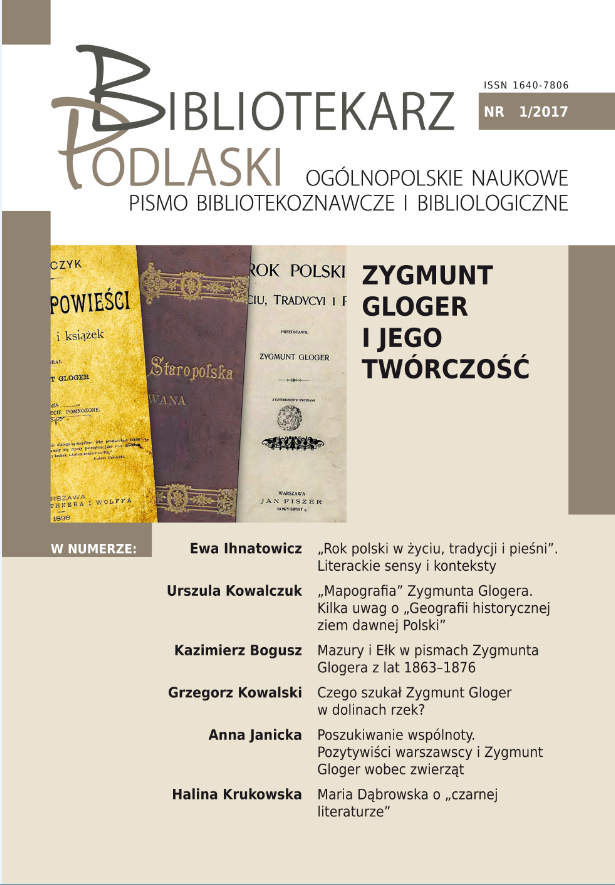Abstract
Making the distinction between ideological stances of Zygmunt Gloger (1845–1910) and young Warsaw positivists from the circle of “Weekly Review”, the author of the study points to the surprising overlap of their opinions about the role of animals in the life of man. As it turns out, despite numerous differences between a landowner from Podlasie, who cultivated his land in his Jeżewo estate, and young enthusiasts of civilizational progress from Warsaw, there are also lots of similarities in their attitudes towards wildlife, and in their sensitivity or empathy. Gloger was interested in the current research into animal instinct and intelligence. He examined the history of Polish culture, looking for notable individuals dedicated to animal protection. Young positivists started their education by reading the works of Charles Darwin. By combining Darwin’s theory, their reformative desiderata and exceptional social dedication, they developed a truly unique sensitivity to the plight of animals, which found its expression in their press articles and correspondence. Such an attitude (of Gloger and of young positivists) was not common in the second part of the 19th century, at the time when hunters were widely respected.
References
[Anonim], Dwie nowe teorie ustroju świata zwierzęcego, „Przegląd Tygodniowy” 1866, nr 22, s. 175; nr 23, s. 182-183; nr 24, s. 190-192.
[Anonim], (O różnicy człowieka od zwierzęcia), „Przegląd Tygodniowy” 1869, nr 11, s. 89-90.
[Anonim], Władze duchowe u zwierząt (z Büchnera). (Dokończenie), „Przegląd Tygodniowy” 1867, nr 16, s. 127.
Beer G., „Przyjemność jak tragedia”. Wyobraźnia a rzeczywistość materialna, przeł. M. Mrozik, „Teksty Drugie” 2011, nr 3.
Długokącka T., Miejsce darwinizmu w działalności „Przeglądu Tygodniowego” (1866– –1890), [w:] Materiały do dziejów myśli ewolucyjnej w Polsce, z. 1, red. K. Pietrusiewicz i A. Straszewicz, Warszawa 1963.
Gielata I., Piętno Darwina, „Świat i Słowo” 2010, nr 1.
Gloger Z., Notatki spostrzegacza nad instynktem i zmyślnością zwierząt, „Wszechświat.
Tygodnik Popularny, Poświęcony Naukom Przyrodniczym” 1887, nr 4, s. 61, nr 5, s. 75-76; 1888, nr 17, s. 270-271, nr 18, s. 285-286.
Gloger Z., Wystawa rolniczo-przemysłowa w Retowie, „Biblioteka Warszawska” 1878, T. IV, s. 480-490, [w:] tegoż, Pisma rozproszone, t. II: 1877-1889, red. naukowa edycji J. Ławski i J. Leończuk, wstęp A. Janicka i D. Rembiszewska, opracowanie tekstów i przypisy Ł. Zabielski, S. Kochaniec, M. Siedlecki, G. Kowalski, noty i słownik czasopism A. Janicka, indeksy opracowali M. Al-Kaber i M. Siedlecki, Białystok 2015.
Janicka A., Zygmunt Gloger wobec teorii i praktyki pozytywizmu, [w:] Z. Gloger, Pisma rozproszone, t. II: 1877-1889, red. naukowa edycji J. Ławski i J. Leończuk, wstęp A. Janicka i D. Rembiszewska, opracowanie tekstów i przypisy Ł. Zabielski, S. Kochaniec, M. Siedlecki, G. Kowalski, noty i słownik czasopism A. Janicka, indeksy opracowali M. Al-Kaber i M. Siedlecki, Białystok 2015.
Julian O. [Ochorowicz], Dzisiejsze stanowisko magnetyzmu zwierzęcego, „Przegląd Tygodniowy” 1867, nr 21, s.166.
Kłosiński K., Literaturoznawczy darwinizm, „Teksty Drugie” 2011, nr 3.
Koziołek R., Kompleks Darwina, „Teksty Drugie” 2011, nr 3.
Niewiadomski N., O cieple zwierzęcem, „Przegląd Tygodniowy” 1867, nr 12, s. 94-96.
Schollenberger J., „Sympathy Beyond The Confines of Man…”. Karol Darwin wobec zwierzęco-ludzkich praktyk codzienności, „Wiek XIX. Rocznik Towarzystwa Literackiego im. Adama Mickiewicza”, Rok VII (XLIX) 2014.
Sobieraj T., W służbie prawdy i postępu. Ideał antropologiczny uczonego (mężczyzny) we wczesnej publicystyce „Przeglądu Tygodniowego”, [w:] Pozytywiści warszawscy. „Przegląd Tygodniowy” 1866–1876, seria I: Studia, rewizje, konteksty, red. i wstęp A. Janicka, Białystok 2015.
Zygmunt Gloger – pisarz, myśliciel, uczony. Studia, red. naukowa J. Leończuk, J. Ławski, Ł. Zabielski, Białystok 2016.
Articles published in the “gold open access” mode on the basis of a non-exclusive license agreement between the publisher and the author. Permitted use:
- the publication may be read and stored on any device,
- the publication may be cited (with obligatory reference to the author, the title of the text, as well as the full title, bibliographic address of the issue and page of the journal)
The editorial team of “Bibliotekarz Podlaski” implements an open access policy by publishing materials in the form of the so-called Gold Open Access. From volume 42 (issue 1/2019), the journal is available under the Creative Commons license (Attribution – ShareAlike: CC BY-SA).
The key declarations of the Open Access and Open Science movement, which we fully support, are available on the CEON Open Science website.
COPYRIGHT:
The editorial team of “Bibliotekarz Podlaski” implements an open access policy by publishing materials in the form of the so-called Gold Open Access. The journal is available under the Creative Commons license – Attribution – ShareAlike 4.0: International: CC BY-SA 4.0).
The key declarations of the Open Access and Open Science movement, which we fully support, are available on the CEON Open Science website.
“Bibliotekarz Podlaski” allows its readers to read, download, copy, distribute, print, search and link to the full content of articles. We enable full, immediate, unlimited (both in a territorial, temporal and technical sense) open access to all published content, in accordance with the principle that freely available research increases and accelerates the global development of science and the exchange of knowledge.
The editorial team of “Bibliotekarz Podlaski” encourages authors to place articles published in the journal in open repositories (after the review or the final version of the publisher), provided that a link to the journal’s website is provided.
The journal does not charge the authors any fees for accepting and publishing their texts.


